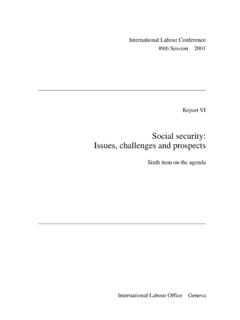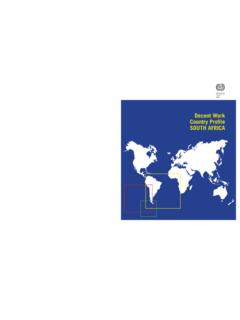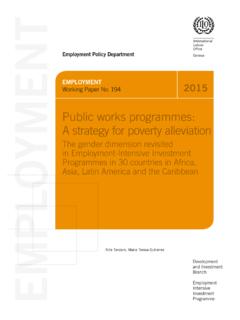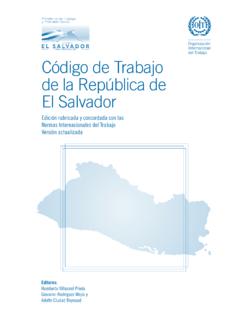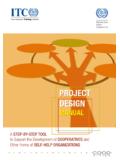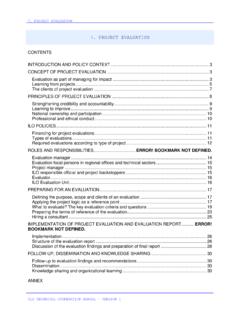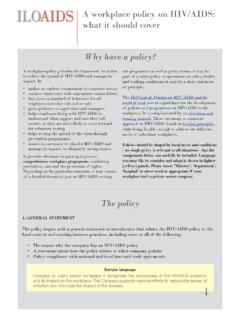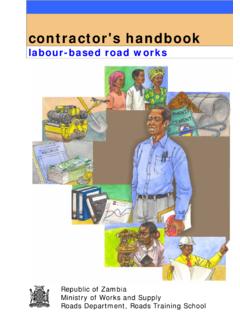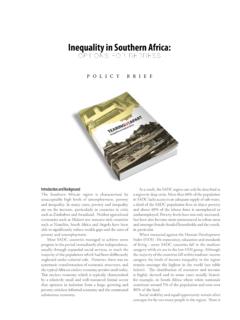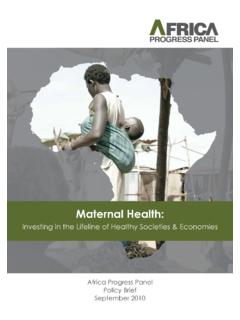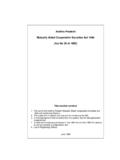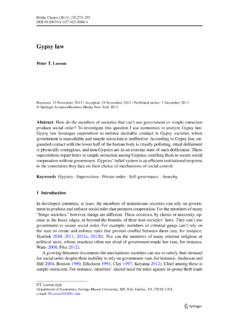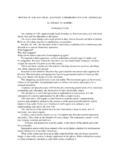Transcription of Guidelines for a just transition - copyrighted
1 Guidelines for a just transition towards environmentally sustainable economies and societies for all Guidelines for a just transition towards environmentally sustainable economies and societies for all Copyright International Labour Organization 2015. First published (2015). Publications of the International Labour Office enjoy copyright under Protocol 2 of the Universal Copyright Convention. Nevertheless, short excerpts from them may be reproduced without authorization, on condition that the source is indicated. For rights of reproduction or translation, application should be made to ILO Publications (Rights and Licensing), International Labour Office, CH-1211 Geneva 22, Switzerland, or by email: The International Labour Office welcomes such applications.
2 Libraries, institutions and other users registered with a reproduction rights organization may make copies in accordance with the licences issued to them for this purpose. Visit to find the reproduction rights organization in your country. ISBN 978-92-2-130627-6 (print) 978-92-2-130628-3 (web pdf). Also available in (French): (Principes directeurs pour une transition juste vers des conomies et des soci t s cologiquement durables pour tous) (ISBN 978-92-2-230627-5), Geneva, (2015); and in (Spanish): (Directrices de pol tica para una transici n justa hacia econom as y sociedades ambientalmente sostenibles para todos) (ISBN 978- 92-2-330627-4), Geneva, (2015).
3 ILO Cataloguing in Publication Data The designations employed in ILO publications, which are in conformity with United Nations practice, and the presentation of material therein do not imply the expression of any opinion whatsoever on the part of the International Labour Office concerning the legal status of any country, area or territory or of its authorities, or concerning the delimitation of its frontiers. The responsibility for opinions expressed in signed articles, studies and other contributions rests solely with their authors, and publication does not constitute an endorsement by the International Labour Office of the opinions expressed in them.
4 Reference to names of firms and commercial products and processes does not imply their endorsement by the International Labour Office, and any failure to mention a particular firm, commercial product or process is not a sign of disapproval. ILO publications and digital products can be obtained through major booksellers and digital distribution platforms, or ordered directly from For more information, visit our website: or contact Printed in Switzerland The ILO endeavours to use paper sourced from forests managed in an environmentally sustainable and socially responsible manner. I. Background and scope At its 102nd Session (2013), the International Labour Conference adopted a resolution and a set of conclusions, hereafter referred to as the conclusions, concerning sustainable development, decent work and green jobs putting forward a policy framework for a just transition .
5 At its 321st Session (June 2014), the Governing Body of the ILO endorsed the proposal to hold a tripartite meeting of experts in 2015 as a follow-up to the Conference conclusions. Following the decision of the Governing Body, the Office convened the Tripartite Meeting of Experts1 from 5 9 October 2015 to: review, amend and adopt draft Guidelines based on a compilation and thorough review by the Office of experiences from country policies and sectoral strategies towards environmental sustainability, the greening of enterprises, social inclusion and the promotion of green jobs;. distil lessons and good practices in respect of policy formulation in each of the nine policy areas identified in the just transition framework, through tripartite dialogue.
6 Recommend ways to give practical effect to the Guidelines in terms of their dissemination and practical application at the country level by constituents and adopt policy Guidelines on a just transition towards environmentally sustainable economies and societies for all. The following Guidelines as agreed by the Experts are meant to provide non-binding practical orientation to Governments and social partners with some specific options on how to formulate, implement and monitor the policy framework, in accordance with national circumstances and priorities. The Guidelines are anchored in the vision, opportunities and challenges, guiding principles and the type of policies to implement, as contained in the conclusions.
7 The Guidelines also incorporate the International Labour Standards listed in the appendix to the conclusions across policy areas. The following text reproduces verbatim parts of the text of the conclusions which provide the basis for the present policy Guidelines . These parts include the vision, the opportunities and challenges identified, as well as guiding principles. 2 It also reproduces the introduction to the key policy areas and institutional arrangements framework 3 and the paragraph concerning rights. 4 The latter includes a reference to the appendix of the conclusions with some international labour standards and resolutions that may be relevant to the just transition framework.
8 This appendix is reproduced as Annex 1 of the present text. 1. See Annex 2, List of Experts. 2. 2013 ILC conclusions, paras 1 13. 3. 2013 ILC conclusions, para. 14(1), (2) and (3). 4. 2013 ILC conclusions, para. 14(m). 3. II. Our vision 1. The four pillars of the Decent Work Agenda social dialogue, social protection, rights at work and employment are indispensable building blocks of sustainable development and must be at the centre of policies for strong, sustainable and inclusive growth and development. 2. Sustainable development means that the needs of the present generation should be met without compromising the ability of future generations to meet their own needs.
9 Sustainable development has three dimensions economic, social and environmental . which are interrelated, of equal importance and must be addressed together. 3. Sharing a common global purpose, there are different approaches, models and tools available to each country, in accordance with its national circumstances and priorities to achieve sustainable development in its three dimensions, which is our overarching goal. 4. A just transition for all towards an environmentally sustainable economy, as described in this document, needs to be well managed and contribute to the goals of decent work for all, social inclusion and the eradication of poverty.
10 5. Decent work, poverty eradication and environmental sustainability are three of the defining challenges of the twenty-first century. Economies must be productive to meet the needs of the world's growing population. societies must be inclusive, providing opportunities for decent work for all, reducing inequalities and effectively eliminating poverty. 6. When referring to the greening of economies, enterprises and jobs, we consider it in the context of sustainable development and poverty eradication. This is one of the important tools for achieving sustainable development and could provide options for policy- making.
